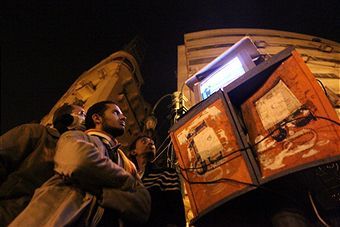 Egypt has made al-Jazeera English. The Qatari satellite channel has been the
“go-to” channel; it has had more reporters on the ground than the BBC and CNN; and it has used technology in ways that make Western media look like they belong to a different era.
Newspapers from the New York Times to the Wall Street Journal have talked about the channel’s role in the protests.
Egypt has made al-Jazeera English. The Qatari satellite channel has been the
“go-to” channel; it has had more reporters on the ground than the BBC and CNN; and it has used technology in ways that make Western media look like they belong to a different era.
Newspapers from the New York Times to the Wall Street Journal have talked about the channel’s role in the protests.
And all this despite its broadcasts being banned in Ben Ali’s Tunisia and blocked in Egypt. Facing these constraints, the TV channel switched to social media like Facebook, Twitter, and YouTube. Its website posted Live Messages — audio messages recorded from phone calls placed by correspondents — on the ground, and used a facility called Scribble Live to get these updates online fast. The company’s English-language website has seen a 2,000 percent increase in visits, with more than 60 percent of that traffic coming from the United States. Every White House office is said to be live-streaming its reports, while its Cairo-based correspondent Ayman Mohyeldin has become a household name. Two nights ago in Tahrir Square, people were even chanting: “Long live al-Jazeera.”
The contrast with the Bush administration could not be greater, when the Daily Mirror reported that during an April 2004 White House meeting with Tony Blair, George W. Bush floated the idea of bombing al-Jazeera’s headquarters in Qatar.
But al-Jazeera’s importance is, of course, not a new phenomenon. Their string of successes began when covering the intifada in 2000. And having cultivated the Taliban and even parts of Al Qaeda, al-Jazeera was able on September 11 2001 to score a coup – including a taped conversation from Osama Bin Laden himself.
Even so, the last couple of weeks have been momentous for the channel. Yet, while al-Jazeera is being feted around the world now, it is worth pausing for a moment to reflect. If the station is championing democracy, it is not the kind easily recognisable in Britain. As Hugh Miles, who wrote a book about the channel, pointed out:
“Never once in the 21 days of conflict did al-Jazeera acknowledge that invading Iraq had anything to do with democratisation: it was a colonial conflict.”
Throughout the Iraq War, al-Jazeera’s tone was sympathetic to the Iraqis and hostile toward the Americans. The non-English version of al-Jazeera, which is watched in the Middle East, is decidedly more biased and unprofessional than al-Jazeera English. Following a battle in Nasiriya during the Iraq War, al-Jazeera broadcast a thirty-second video of exuberant Iraqis celebrating over the corpses of two dead British servicemen. The anchor apologised for the ‘horrific’ pictures, explaining that ‘it is in the interests of objectivity that we bring them to you.’
But, in its slant on the Iraq War, the channel may be no guiltier than other outlets. I have often participated in interviews and debates on al-Jazeera and found them a lot more professional and unbiased than, say, Russia Today, where anti-Americanism is rife. But it cannot be overlooked that al-Jazeera is run and funded by a state, which itself stifles dissent – a subject al-Jazeera sometimes reports on, but rarely in detail. The chairman of the network’s board of directors is Sheikh Hamad bin Thamer Al-Thani, the former Qatari deputy minister of information, and the exact nature of the relationship between the Qatari state and the TV channel is opaque. So let us watch al-Jazeera, praise it for its role in Egypt, but not see it as a champion of democracy. It is not a new BBC World Service.






Comments